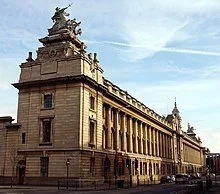A View from the Handlebars: The Corridors of Power
CycHull has walked the corridors of power, putting the cyclist’s viewpoint to the people charged with developing Hull’s active travel network.
CycHull-ists Graham, Andrew, Martyn and Steve had a constructive meeting at the Guildhall with a council cabinet member and two senior officers, with responsibility for roads and transport.
They talked to us for over an hour about their commitment to making active travel work in Hull. Working virtually from a standing start in 2020, they told us the council had had to work fast (in just eight weeks) to take advantage of government funding to install emergency ‘pop-up’ cycle infrastructure at the height of the pandemic. Any delay would have jeopardised qualifying for all subsequent tranches of funding. So while cyclists, like other road users, can see the results are far from perfect – particularly painted lanes which depend on the awareness and goodwill of motorists and the continuing lack of proper infrastructure at junctions – we now better understand the constraints they were operating under.
Thankfully, the council isn’t saying that what we’ve got now is the finished product. Instead, the talk is about ‘iteratively improving’ on version 1.0 – music to our ears!
However, there are major constraints, and continuity of funding is one of them. Unlike bigger cities such as Leeds and Greater Manchester which have some power over setting their own transport budgets, Hull council constantly has to put in bids, essentially begging central government for funds to improve infrastructure. And because, until now, active travel has never seriously been on the agenda, officers responsible for implementing it are having to play catch-up – mainly learning from Dutch and Belgian cities like Antwerp and Rotterdam. The latter, we pointed out, could be a particularly good case study for Hull to learn from. Rotterdam, like Hull (one of our ‘twin’ cities), is a city built on trade and industry but which has recognised the positive difference active travel can make on the lives of its citizens.
Another nationally imposed constraint curbs the number of Hull roads that can have a 20mph speed limit – viewed by many as a game changer for making active travel feel safer. Redesignating roads, which ‘feel like’ they should have 30mph limits, as 20mph limits, could leave the council officer who signed off the reduction legally liable in the event of an incident. Currently, Hull has a high number of such roads, owing to the need to act as alternatives for through traffic on the A63. In that case, we argued that the council should plan to re-engineer more roads that are useful to the active travel network, so that they feel like 20mph roads. It won’t be swift progress, but we’re talking to the right people to make it happen.
We also talked about addressing the school run as an effective way to increase active travel and reduce congestion. Many schools, we were told, are just not interested. The council has trialled restricting parking spaces near to primary schools in the past, only to find that the take-up of active travel reduces as soon as parking restrictions are relaxed. We’d therefore argue for a much more holistic approach: it’s not enough just to restrict parking. The council needs to be more positive: promoting the benefits of active travel by getting the kids as well as the parents involved – and then making all the walking and cycling routes to school much safer.
Speaking of promotion, we took the council bods to task on their tendency to frame new cycle infrastructure as being ‘for cyclists’. We feel this ‘others’ cyclists. It’s far better to talk about cycle lanes being for everyone – even if you don’t use them, others will, and that frees up the roads for people who really need them. We pointed out our new slogan ‘Getting Hull Moving’ which is exactly what we think active travel is all about. They seemed interested. But we’ll wait and see what the council’s newly appointed active travel communications specialist makes of it.
Overall, though, it was a very constructive meeting and hopefully gives us some common ground to build on for the future

